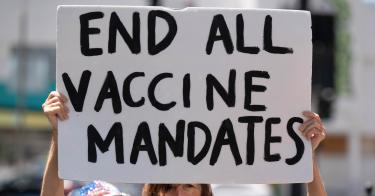Every decision by the government (or anyone else) comes with costs. Making good decisions is a matter of looking squarely at all the costs and benefits and choosing wisely in their light.
One lesson of the COVID-19 pandemic is the importance and difficulty of accounting for all the costs of agency actions in emergency situations. The ongoing vaccine mandate for health care workers is a case in point.
As the Delta variant of COVID-19 spread in 2021, the U.S. Centers for Medicare and Medicaid Services invoked its emergency authorities to issue a vaccine mandate for health care workers. The stated goals of the mandate were to protect health care patients and workers and to create health care environments that people could safely access.
The government has an obligation to reflect now on the impact of the mandate and to take new research and experience into consideration, especially in light of the Biden administration’s recently announced plan to conclude the official public health emergency in May.
Since the pandemic started, the health care industry has rapidly lost workers for a variety of reasons, and the industry faces massive staffing shortages.
U.S. News reported that 18% of health care workers left their jobs between February 2020 and September 2021. According to employee benefits manager Mercer, in 2025, the health care workforce will need an additional 446,300 home health aides, 95,000 nursing assistants, 98,700 medical and lab technologists and technicians, and 29,400 nurse practitioners to meet the nation’s health care needs.
We do not know how many health care workers have left their jobs or been terminated for failure to get vaccinated. Fierce Healthcare reported that among some of the health care providers that have lost staff, Southcoast Health in Massachusetts fired 216 workers for failing to comply with the mandate, Houston Methodist Hospital in Texas lost 153 workers to terminations and resignations over the mandate, and Indiana University Health had 125 workers resign due to the mandate.
Nor do we know how many potential health care workers have been deterred from entering the field because they would be required to get vaccinated.
In November, 22 state attorneys general called for the Biden administration to end the vaccine mandate for health care workers due in part to the staffing shortages.
More recently, the U.S. House of Representatives passed the Freedom for Health Care Workers Act to end the mandate. As the Senate considers this legislation, and as the agency itself considers next steps, it’s vital that lawmakers and regulators avoid regulatory myopia.
They must also prioritize ending the staffing crisis so that Americans can get the care they need. That means taking a hard look at the costs of the vaccine mandate for health care workers, including an honest assessment of its effect on staffing shortages.
This piece originally appeared in The Daily Signal



